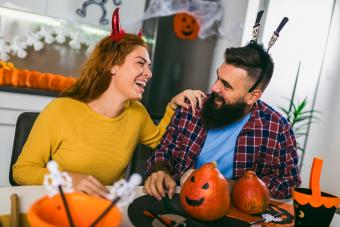
Does Mexico celebrate Halloween? Mexico has intermingled Halloween, a tradition born from pagan beliefs and transported to Mexico from the United States, with a Mexican celebration for dead ancestors and loved ones. Halloween and Mexico's traditional Day of the Dead have joined up to become a multi-day, fun, colorful celebration.
Halloween in Mexico
Halloween has been celebrated in Mexico for many years, but it's primarily a children's festival.
Día de las Brujas
Halloween or Día de las Brujas, meaning Day of the Witches, occurs on October 31st. This is when Mexican children wear costumes and go from home to home trick-or-treating. But Mexican trick-or-treaters don't shout "trick or treat," they chant "Queremos Halloween!" ("We want Halloween!") For the grownups, Mexican Halloween is a chance to dress up and attend parties. Still, the festivities don't end with Halloween night - they get much more culturally significant.
Day of the Dead Celebrations

Day of the Dead (el Día de los Muertos) celebrations are much bigger than Halloween, and they often begin before the Day of the Witches. Additionally, Mexico is primarily a Catholic country. So, Halloween and Day of the Dead celebrations intermingle with Catholic holy days.
- All Hallows' Eve, on October 31st, coincides with Día de las Brujas
- All Saints' Day, on November 1st, coincides with Día de los Angelitos, meaning Day of Little Angels, which celebrates the lives of all the babies and children who have died.
- All Souls' Day, on November 2nd, coincides with Día de los Muertos, meaning Day of the Dead. It's dedicated to celebrating the lives of all dead family members.
Halloween and the Day of the Dead
Día de los Muertos isn't a Mexican version of Halloween. Yes, there are similarities. Death is a shared theme, but there are also differences. The two annual events differ in traditions and tone. Halloween is a spooky night of scary ghosts, goblins, terror, and mischief. Día de los Muertos festivities unfold over two days with a beautiful array of explosive color and life-affirming joy.
- The Day of the Dead holiday, el Día de los Muertos, is on November 1st and 2nd.
- On Día de los Muertos, the Mexican people believe the gates of heaven open so the dead can return to be with their loved ones.
- It celebrates life and death together and encourages the spirits of the dead to visit the physical world and enjoy the gifts, food, and festivities.
- Its symbols are skulls, bright orange marigolds, and monarch butterflies that are believed to house the spirits of those who have died.
- People prepare altars, known as ofrendas, in private homes and cemeteries and decorate them with skulls, candles, family photos, and other memorabilia to encourage the souls to visit. Offerings such as toys for dead children and bottles of tequila and mezcal are added for adults.
- Participants paint their faces with brightly colored calaveras makeup to represent skulls.
- Families tend graves and leave offerings, plant flowers and trees, and some wear the clothes of their dearly departed. Others might even bring a Mariachi band to serenade their loved ones and serve drinks and food at their graves.
A Commercial Bonanza

Mexican stores, shops, and markets sell shoppers everything they need for two holidays. Shoppers buy Halloween costumes for the kids, masks, jack-o'-lanterns, fake blood, spiderwebs, Halloween decorations, candy for trick-or-treaters, and more. But they also sell everything ranging from chocolate skulls, candles, incense, and marigolds for altars to calaveras makeup, La Calavera Catrina (or simply La Catrina,the elegant skull) finery, and noise makers for Day of the Dead celebrations. Intermingling Halloween and Day of the Dead is a commercial bonanza for Mexican merchants and store owners.
Halloween Kicks off Day of the Dead
As Halloween, cultural tradition, religion, and commercial intermingle, it becomes very confusing to answer the question: Does Mexico celebrate Halloween? Many Mexicans see no issue incorporating Halloween into the Day of the Dead celebrations. Others say Halloween shouldn't have anything to do with the 3,000-year-old Latin American tradition of celebrating the dead. Some even argue against Halloween because it's an American import. But nonetheless, in modern-day Mexico, Halloween kicks off the Day of the Dead celebrations with bright and colorful traditions.







